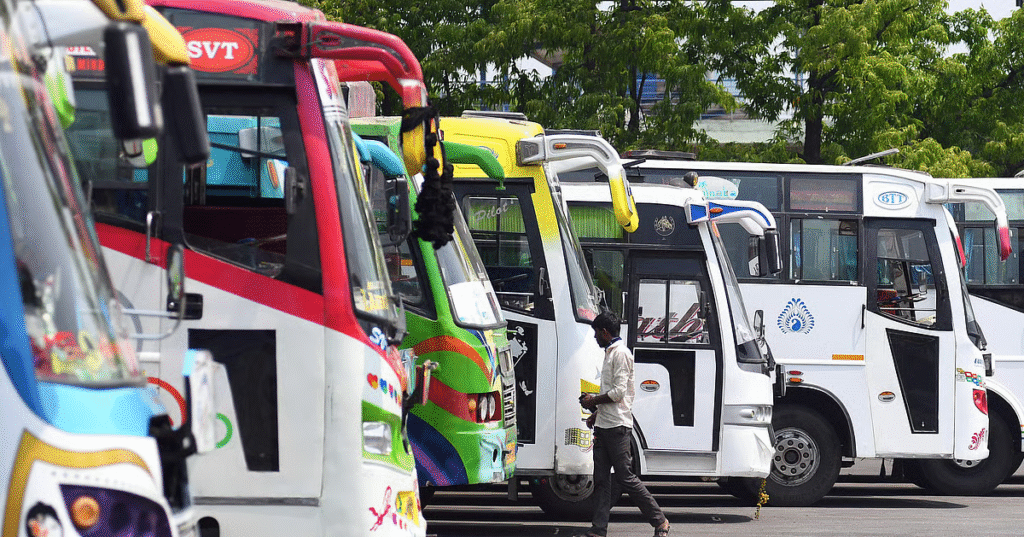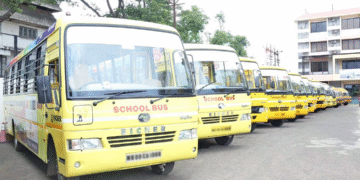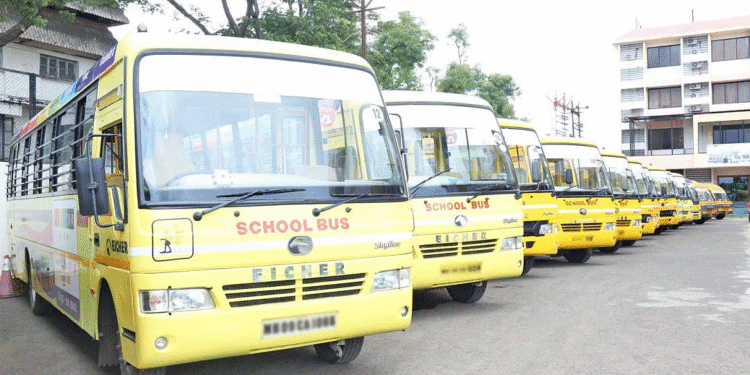Mumbai private bus operators to go on strike from July 1, impacting daily commuters and school transportation services. Commuters brace for major disruptions across the city
In a major blow to Mumbai’s daily transportation system, private bus operators across the city have announced an indefinite strike starting July 1, 2025. The decision, which comes amid a long-standing tussle with authorities over unmet demands, is set to cripple daily commuting services and significantly impact school transportation, leaving thousands of parents and students in distress.
This development is particularly alarming for Mumbaikars who rely heavily on private buses for daily commute—especially in suburbs and peripheral zones where public transport options remain limited or overcrowded. With over 10,000 private buses including school, staff, and contract vehicles expected to stay off the roads, Mumbai faces a transportation crisis if the strike proceeds as planned.

The core reason behind this large-scale strike is the mounting grievances of private bus operators against the state government. The Mumbai Bus Malak Sanghatana (MBMS) and other allied unions cite issues such as:
- Unfair tax policies
- Delayed permit renewals
- Excessive penalties
- Unresolved regulatory hurdles
- Rising operational costs, especially fuel prices and insurance
Despite repeated requests, operators claim the government has failed to address their concerns. The final straw, according to several union leaders, was the state’s lack of concrete assurance during recent talks.
“We have been patient for months. But now, our survival is at stake. The government is forcing us to stop services with their indifference,” said Ramesh Patil, spokesperson of MBMS.
One of the most significant consequences of the strike will be the suspension of school bus services. As Mumbai gears up for a full academic session post-summer vacations, the absence of dedicated school buses poses serious challenges for students and parents.
Over 2,000 schools across Mumbai depend on private bus contracts for student transportation. Without alternative arrangements in place, lakhs of students might face delays or be forced to rely on unsafe or overcrowded transport modes.

Parents are already voicing their concerns:
“How do we send our children safely to school every day? Local trains are too packed, and cabs aren’t affordable daily. This is not fair to working parents,” said Smita Joshi, a parent from Kandivali.
School administrations, too, are on high alert. Several have issued advisories to parents, asking them to prepare for alternative transport or consider virtual classes if the strike continues beyond a few days.
While school students will bear the brunt, the effects of the strike will ripple through Mumbai’s daily workforce. Several corporate shuttle buses, private employee transportation services, and intercity buses fall under the private operator umbrella.
During peak hours, Mumbai’s suburban train network, already under immense pressure, could witness dangerous levels of overcrowding as stranded bus users turn to local trains and autos.
Auto-rickshaws and taxis are expected to jack up prices, making commuting even more expensive. Previous strikes have shown that surge pricing and long queues become common in such scenarios.
The unions have formally submitted a 10-point charter of demands to the Maharashtra government. Some of the prominent demands include:
- Abolition or reduction of the Motor Vehicle Tax for private buses.
- Subsidies on diesel or transition incentives for electric buses.
- Speedy renewal of bus permits without harassment or delays.
- Single-window clearance for registration and compliance paperwork.
- Exemption from certain toll taxes on intra-city routes.
- Protection against extortion by middlemen and touts.
- Insurance premium capping for private contract vehicles.
- Emergency support fund for operators during economic slumps.
- Standardization of school bus norms across all boards.
- Inclusion in policy-making discussions involving transport reforms.
The Maharashtra Transport Department has urged the unions to reconsider the strike and return to the negotiation table. In a press release issued on June 24, a senior transport official stated:
“The government is not ignoring their concerns. Several points are under review, and we are open to further discussion. We appeal to the operators to not hold the public to ransom.”
However, union representatives argue that words alone aren’t enough anymore. They demand a written timeline of implementation for their demands to suspend the strike.
With the likelihood of a full-fledged strike from July 1, here are a few steps that Mumbai residents and parents can consider:
- Use public transport smartly: Consider early commuting to avoid peak rush hours.
- Form carpool groups: Coordinate with neighbors or colleagues.
- Keep an eye on school notifications: Schools may switch to online or shift timings.
- Monitor real-time traffic updates: Use apps like Google Maps, Ridlr, and mIndicator.
- Check for government announcements regarding additional BEST buses or special services.
The Brihanmumbai Electric Supply and Transport (BEST) undertaking has said it will try to augment its fleet temporarily to handle additional passenger loads. However, with limited spare buses and staff constraints, their capacity to absorb the entire burden remains doubtful.
The Western and Central Railways, too, are expected to run additional local services, but sources say coordination with railway authorities is still ongoing.
Several political parties have jumped into the fray, accusing the ruling government of neglecting grassroots issues and failing to prioritize public transport reforms. The opposition has announced support for the bus unions, demanding immediate resolution.
Public sentiment is also leaning towards frustration. Social media platforms are flooded with hashtags like #BusStrikeMumbai, #SchoolBusCrisis, and #FixMumbaiTransport, with citizens tagging ministers and calling for accountability.















 Categories
Categories









